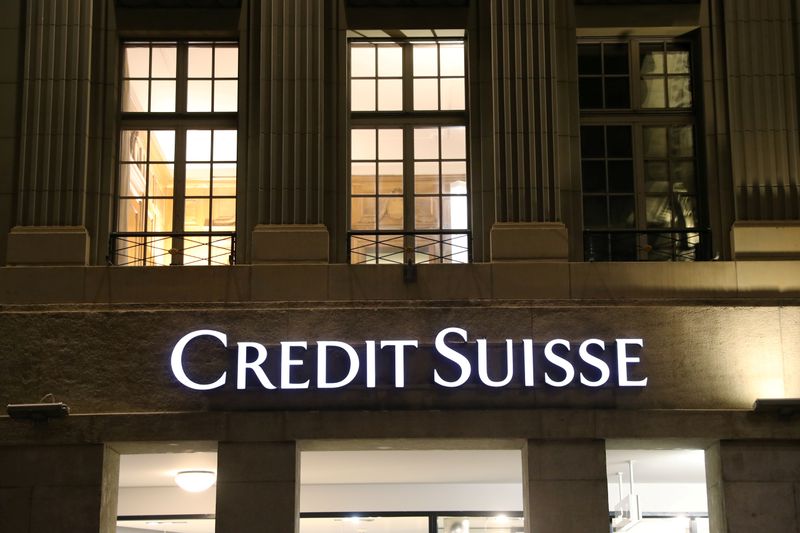By Brenna Hughes Neghaiwi, Carolyn Cohn and Oliver Hirt
ZURICH (Reuters) - Credit Suisse (SIX:CSGN) may have to book a charge over its dealings with Greensill, it warned on Tuesday, as investor scrutiny grows over its relationship with the British supply-chain finance company that collapsed into insolvency.
The Swiss bank has had to close around $10 billion of supply-chain finance funds that bought notes issued by Greensill, and which it marketed to clients. It is also trying to recoup a $140 million loan it made to the company last year.
"While these issues are still at an early stage, we would note that it is possible that Credit Suisse will incur a charge in respect of these matters," it said.
Greensill filed for insolvency last week after losing insurance coverage for its debt repackaging business.
Credit Suisse's share price has fallen over 10% since it announced its supply-chain funds were suspended on March 1. It has paid investors about $3.1 billion in redemptions from the four funds so far, and said it would be announcing further cash distributions over coming months.
The bank also said on Tuesday that, "contrary to certain reports", its chief risk and compliance officer, Lara Warner, was not aware until Feb. 22 that insurance related to Greensill could expire on March 1.
Greensill founder Lex Greensill said in a court filing last week that he kept senior individuals at Credit Suisse, including Warner, informed about the funds' insurance coverage in the "weeks" leading up to its insolvency application on March 8.
The collapse has put fresh pressure on Credit Suisse Chief Executive Thomas Gottstein who has been trying to move the bank on from a string of bad headlines, spanning a spy scandal that ousted predecessor Tidjane Thiam to a $450 million write-down on a hedge fund investment.
The level of oversight and risk management applied at the bank's asset management division is under scrutiny particularly as Gottstein had ordered a review of the Greensill funds last year.
Supply-chain financing, or reverse factoring, is a method by which companies can get cash from banks and funds such as Greensill to pay their suppliers without having to dip into their working capital. See EXPLAINER:
Greensill had large exposure to one client, GFG Alliance, which is controlled by steel magnate Sanjeev Gupta and has started to default on its debts, according to Greensill's insolvency application. Gupta said on Friday the conglomerate was in talks with Greensill's administrators on a standstill agreement to pause its debt payments to Greensill for an agreed period.
COSTS 'IMPOSSIBLE TO ESTIMATE'
The saga overshadowed what was otherwise a strong start to the year for Credit Suisse, whose shares opened up 1.8% on Tuesday as it said it had achieved the highest level of pretax income in both January and February in a decade.
Andreas Venditti, analyst at Bank Vontobel, said the bank was facing a loss of confidence among investors.
"The Greensill case has cost Credit Suisse around three billion francs in market capitalization. Investors have been reassessing the risks to which the bank is exposed. In a worst-case scenario the bank faces years of litigation," he said.
"It is currently virtually impossible to estimate how high the direct costs of the case will be for Credit Suisse. Investors don't like uncertainty."
Three Credit Suisse investors told Reuters they were concerned about the fallout for the bank. They declined to be named due to the sensitivity of the matter.
An investor in Credit Suisse debt said the main financial risk was to the bank's reputation, which it said was a key asset for the wealth management business.
One Credit Suisse shareholder said the bank should fully compensate investors in the supply chain funds. A second equity investor said that, as well as reputational risk, it was worried about the effect of the Greensill collapse on the bank's future asset-raising and its credentials in the growing business of socially responsible investing.
Credit Suisse declined to comment beyond its statements.
The bank has hired external firms to help deal with regulators and insurers amid questions over the contracts that underpinned Greensill's security. It has also recovered some $50 million of the $140 million bridge loan, it said, leaving its outstanding collateralised loan at $90 million.
Credit Suisse said on Tuesday that its asset management division, which sold the funds to investors, was working closely with Greensill's administrator, Grant Thornton, and with other parties to facilitate the recovery of funds.

Japanese insurer Tokio Marine, which provided $4.6 billion of coverage to Greensill credit notes through an Australian unit, is investigating the validity of those policies. A person with knowledge of the matter has said these were directly linked to the Credit Suisse funds.